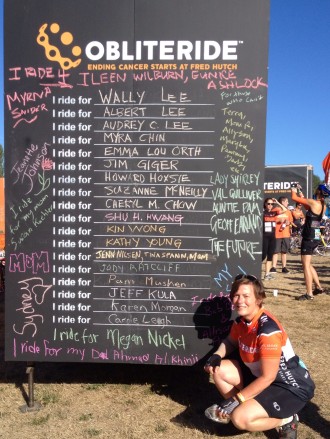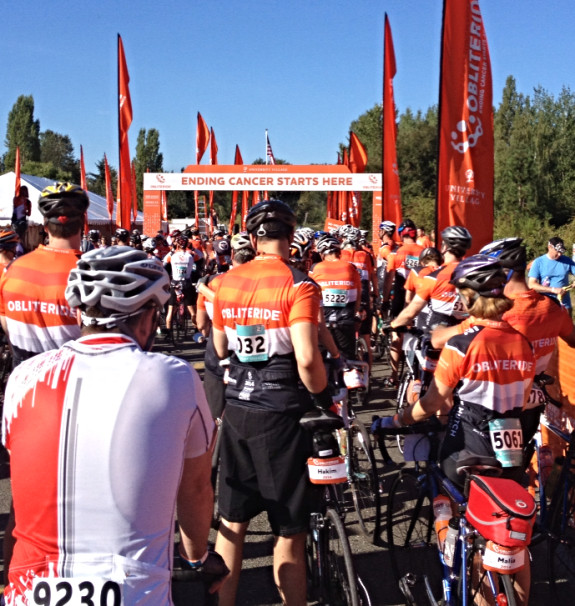Editor’s Note: Leigh Pate is a writer and photographer in Seattle who has biked across the US and through India. She reached out to Seattle Bike Blog offering to write about her experience biking in Obliteride as she continues healing from a battle with cancer. You can donate to her Obliteride fundraising campaign here.
 “What kind of cancer did you have?”
“What kind of cancer did you have?”
I slow down and drop back alongside an older man sitting very upright on sturdy bike with a rack and two big mirrors jutting out the side of his handlebars.
“Breast cancer,” I answer. “Did you have cancer, too?”
“Lymphoma,” he answers. “Just finished radiation a year ago.”
We are riding the 50-mile route of Obliteride, a bike ride to raise money for Fred Hutchinson Cancer Research Center.
We ride and chat. He explains that the large side mirrors allow him to ride after he fractured his neck and his neck was fused. The mirrors help him see because he can’t turn his head. He laments that the route is a little easier than he was hoping for. Maybe next year he’ll sign up for the century for a little more challenge.
We talk about how coming back from cancer means learning how to do what you love with a whole new body. And we laugh at the once unthinkable accommodations we learned to make so we can do what we love. For him, big side mirrors. For me, special garments to manage side effects from surgery.
Obliteride raises money for the Fred Hutchinson Cancer Research Center. At a time when government research funding has been cut and research has become more expensive, leading cancer research centers like the Hutch are turning to their patients and their community to fill the gap and keep innovative, outside-the-box research funded.
In its second year, this ride is well-supported and well-organized, with routes suitable for many skill levels. Pace-lining teams raced through the century or the two-day route while occasional riders huffed up hills on borrowed bikes, attempting their longest ride ever to shouts of encouragement.
From the Tom Douglas salmon dinner and live music kicking off the event at Gasworks to the volunteer who handed me a delicious ice-cold mint lemonade as I waited in line at a rest stop, riders were treated well and showered with appreciation for their efforts. Over 900 riders have raised well more than one million so far, and fundraising is not over yet. Their goal is to raise more than $2 million, so don’t stop donating yet.
Obliteride has its share of cancer survivors finding ways to do remarkable things after cancer. But it succeeds because of the riders and volunteers and donors who contribute their pedal-power, time and money.
I rode with a woman from Davis, Calif., who found solace riding through our beautiful city on behalf of her brother from Bellevue who just spent six weeks gravely ill in the hospital. I met a young researcher at the Hutch whose face lit up when she explained how her work will help cancer patients live better and longer as more people are surviving. I shared a table at the kick-off dinner with a man who chose to ride Obliteride on his year off from Ironman events because he wanted to ride the beautiful two-day route and just contribute to a good cause.
And I met a couple from Dallas who flew in to volunteer and staffed the rest stop on Mercer Island. They had lost a daughter to cancer, and “Team Sandy” included their entire family riding to raise money and – I suspect – turn their family tragedy into something that could benefit others.
All of us rode or volunteered or donated because we understand that better and faster cancer research though leading research centers like the Hutch will save lives. But many of us rode for much more personal causes.
I signed-up to ride less than a week before the event. Before diagnosis I biked across the US, spent two months biking through India, and raced triathlons. Now, two years after treatment ended, I chose to ride the 50-mile route because I knew I could do that distance safely.
I was treated for breast cancer at the Seattle Cancer Care Alliance — the hospital arm of Fred Hutch — and have benefitted from the high-quality physicians who are drawn to practice there. But what really pushed me to ride was watching a friend die from breast cancer last year. Just two weeks ago another friend who survived her breast cancer was diagnosed with a second, completely unrelated life-threatening cancer, and Fred Hutchinson Cancer Research Center is leading the way in finding better treatment for her rare T-cell lymphoma.
And so I joined the hundreds of cyclists and volunteers who came to Obliteride to make something good come from grief and sickness.
But as I rode from the start line through crowds of cheering supporters. Past the signs with the names of survivors placed along the route. As I rode past orange-clad volunteers who cheered along the route and shouted encouragement. And as I met so many other riders who all have their own story, I realized that this ride wasn’t just about raising money for cancer research. This ride is part of the long journey from recovering from cancer treatment, or losing a loved one, or watching a friend struggle … to truly healing.
So thank you. To everyone who rode. To everyone who volunteered and cheered, and handed out cold drinks and rang the cowbells. To everyone who donated to sponsor a rider, or contributed to make this a great event. To other survivors who figured out how to ride and take their life back after treatment. And mostly, thanks to all the family and friends who supported us – through treatment and by contributing – as we ride to heal.
Because while one bike ride won’t stop cancer, a united community focused on finding cures just might.









Comments
4 responses to “Pate: My experience riding Obliteride as a cancer survivor”
This was my second year riding Obliteride, doing the two day route. The Obliteride team at Fred Hutch puts on a first class event all the way around. While I know fundraising can be daunting and the idea of having your fundraising commitment drawn from your personal credit card is scary, you will be amazed how quickly you can reach your minimum, and with a little extra effort, exceed your goal. This is an event that has big dreams, and big dreams take big numbers. The goal isn’t just to raise millions of dollars annually; it’s to CURE CANCER! I rode 150 miles this weekend with a fundraising minimum of $1975. Simple math, if 6 people ride the 25 mile route (6×25=150), with a fundraising commitment of $1000, that’s $6000 of which 100% would go directly to research at the Hutch. We all know people who have been effected by cancer…how much would you pay to save their lives?
I rode the 2 day ride for the second year in a row and loved every minute, this is quickly becoming my favorite weekend of the summer. Cascade does a wonderful job supporting rides, but Obliteride is on a completely different level and has established the gold standard with music, food, events, and outreach. Agreed with Dave, the fundraising goal can seem a bit daunting but you will be surprised by how many of your friends are effected by cancer and willing to donate. Far off Facebookers who I rarely chat with were some of my biggest contributors.
Can’t wait until next year. Keep up the good work Frend Hutch/Obliteride and all of your wonderful volunteers.
I wish some of this (as in some of all the money raised by the “cure cancer” folks) was spent getting the cancer causing chemicals that we already know about out of our lives.
Yes we need more research on curing folks who have cancer but prevention is worth a lot even if it doesn’t have big $$ attached to it.
My current pet peive is fire retardant chemicals that don’t a) retard fires, b) when they burn are even worse for you to inhale.
http://www.alternet.org/personal-health/tent-camping-america-one-big-toxic-experience
For one thing that is close to home for all of us bicycle riding campers.
More here:
http://www.meriresearch.org/RESEARCH/FireFighterStudies/tabid/361/Default.aspx
http://www.toxichotseatmovie.com/
And plenty more if you go look, including sleepware for children and infants, carpeting which babies crawl around on, sofas etc.
We need these useless (as it they don’t actually work as intended) chemicals out.